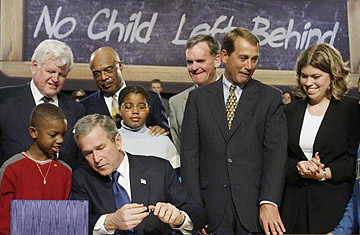
Boehner, second from right, was a key player in getting the No Child Left Behind Act signed into law in 2002
What do Tuesday's election results mean for education reform? Kentucky's Rand Paul is among the newly elected candidates who want to dismantle the Department of Education. That won't happen, but what lies ahead for our students and teachers? Right now all eyes are on John Boehner, the Ohio Republican expected to become Speaker of the House when the new Congress convenes in January. A seasoned negotiator who in the past has succeeded in passing education laws, he could hold sway over policymaking in Washington. But in many ways, his views about education matter less than the question of what he can accomplish given the fractious caucus he will be leading.
First, the good news: Boehner cares deeply about education — and not just when he's stumping on campaign trails. He was one of the "big four" — along with Democratic Senator Ted Kennedy, Republican Senator Judd Gregg and Democratic Representative George Miller — who helped craft the bipartisan No Child Left Behind legislation that was signed into law in 2002. Boehner and Kennedy also hosted annual dinners in Washington, D.C., that raised millions of dollars for Catholic schools in the city.
As a result of his policy initiatives, Boehner is well regarded by many in the education community. Though he started his career as a bomb thrower, he evolved into someone even Democrats describe as a sincere legislator interested in practical solutions to education problems. He's "very adult, in the sense that he's a tough negotiator, but he realized always where he needed to find middle ground and was willing to reach that middle ground after making his case," observes Charles Barone, a former top education aide to Miller, the current chairman of the House Education and Labor Committee.
Boehner headed that committee from 2001 to 2006, and his rise to chairman highlights his formidable political skills and tenacity — he had been booted out of the House leadership in the 1990s. Although both Democratic and Republican aides on Capitol Hill say that he initially viewed No Child Left Behind as a chance to curry favor with George W. Bush by delivering on one of the President's major legislative priorities, Boehner became attached to the policy and its potential positive impact on low-income students. As the bill was debated, he displayed impressive legislative maneuvering, and aides on both sides of the aisle recall him quoting the bill's language from memory.
Now the not-so-good news: With more than 60 new members to contend with in the House, Boehner most certainly will not rule by fiat. He won't even have much room for compromise without losing too many votes on the right or left. Although education is often seen as a bipartisan issue, there is actually not a lot of agreement on specific policy around contentious issues such as national education standards, school choice and performance pay for teachers. Moreover, many of Tuesday's winners are headed to Washington set on cutting federal spending, which means that unlike in the past, big infusions of cash will not be available to help grease the wheels for political deals around education reform.
There are also poorer relations between the Obama Administration and Capitol Hill than is commonly assumed. "This Administration has no clue whatsoever about how to deal with Republicans," says Vic Klatt, a longtime Republican education aide and lobbyist. "The education folks, in particular, have trouble."
He's right. The Administration does not yet have any major education-policy victories that didn't come through regulation or on the back of other pieces of legislation, such as health care reform or the economic stimulus bill. "The worst thing in many respects that happened to [Education Secretary Arne] Duncan was the stimulus," says Klatt. Why? Because it gave Duncan's team, Klatt contends, "the sense that you can snap your fingers, money falls from heaven, and you do what you want with it."
Given the current political climate, there probably won't be any big No Child Left Behind–like education bills in the next two years. (Instead of being a chance to demonstrate bipartisanship, such bills would likely cause Democrats to fight Democrats, Republicans to fight Republicans, and the House to fight the Senate, leaving the Administration trying to lean into the debate as best as it can.) A more likely path to progress is smaller, more modest bills championed by moderate Democrats and re-energized Republicans like Tennessee Senator Lamar Alexander, a former U.S. Secretary of Education, governor and university president who, along with Boehner, is seen as a pragmatist.
Daunting odds do not mean action on schools is impossible. Anyone who doubts Boehner's political skills or commitment to education hasn't been paying attention; this is the same guy who has twice climbed the leadership ladder in the House and put his imprint on national education policy. Yet whether his passion and drive will be enough to get much done in today's tough political environment remains an open question.
Disclosure: Barone is director of policy for Democrats for Education Reform, a group the author helped found. Rotherham stepped down from its board of directors this summer.
Rotherham, who writes the blog Eduwonk, is a co-founder and partner at Bellwether Education, a nonprofit working to improve educational outcomes for low-income students. School of Thought, his education column for TIME.com, appears every Thursday.
